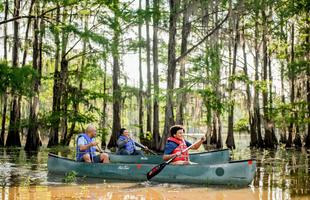A Self-Guided Bonnie and Clyde Tour
Ambush site is just one Louisiana location tied to famous gangsters.
It was May 1934, when a nationally notorious couple’s two-year spree of felonies and murders throughout the South and Midwest abruptly ended in a hailstorm of bullets in rural Bienville Parish.
Bonnie Parker and Clyde Barrow, better known as Bonnie and Clyde, were the most well-known gangsters of the early 1930s, overshadowing John Dillinger, Pretty Boy Floyd, Machine Gun Kelly and Baby Face Nelson during the public enemy era of American history. Radio and newspapers of the day meticulously covered the couple’s trail of bank and store robberies, auto thefts, abductions and kidnappings and more than a dozen killings (of which seven were law enforcement officers) in numerous U.S. states.
Excessive and frequently sensationalized media accounts of the couple’s antics split opinion among the Great Depression-stricken American public—with some seeing Bonnie and Clyde as romantic Robin Hoods of the day and the others seeing the couple as bloodthirsty killers. The spree ended when an accomplice’s tip set up a law enforcement ambush on a lonely road outside of Gibsland in Bienville Parish. Bonnie and Clyde, each shot dozens of times while sitting in their car, died at the scene.
More than 80 years later, interest in Bonnie and Clyde has not fizzled. The duo has been immortalized in songs by artists including Merle Haggard, Jay-Z and Beyoncé. There have been multiple documentaries and movies created (the most famous being the 1967 Hollywood blockbuster Bonnie and Clyde starring Warren Beatty and Faye Dunaway), as well as the Tony-nominated Broadway musical Bonnie & Clyde. In addition, Louisiana sites tied to the crime spree and ultimate demise of Bonnie and Clyde remain popular stops for American history enthusiasts.
- The ambush site has two interpretive markers on the shoulder of La. Hwy. 154 about eight miles south of Gibsland. It is here that a six-man law enforcement posse, made up of Texas and Louisiana lawmen, created a diversion to stop Bonnie and Clyde’s car and then opened fire on the vehicle.
- Downtown Gibsland’s abandoned gas station on South First Street has a small plaque where a pay phone once sat. This is where the posse’s leader, retired Texas Ranger Frank Hamer, called supervisors in Dallas to let them know of Bonnie and Clyde’s deaths.
- Around the corner on Main Street in Gibsland sits the Bonnie and Clyde Ambush Museum, housed in what was once Ma Canfield’s Café, where Bonnie and Clyde stopped for sandwiches just minutes before their deaths. One of Clyde’s shotguns pulled from the death car is among artifacts.
- In nearby Arcadia, Sheriff Henderson Jordan Park on North Railroad Avenue is named after the local sheriff who was an ambush posse member. The park sits at the former location of Conger’s Furniture Store and Funeral Parlor, where Bonnie and Clyde’s death car was towed and the couple was subsequently embalmed by undertakers C.F. Bailey and H.D. Darby.
- Bonnie and Clyde’s embalming was not Darby’s first brush with the couple. Bonnie and Clyde stole Darby’s car, abducted a female friend and him from the boarding house in which he lived and later dumped the two, unharmed, in rural southwest Arkansas. The boarding house no longer exists, but it sat at the corner of North Trenton and West Georgia streets in downtown Ruston. While Hollywood took poetic license with the event in the script, the 1967 movie included the Ruston auto theft, kidnapping and release event, with Gene Wilder playing the undertaker’s role.
- To the west in Shreveport, an abandoned diner sits downtown at 422 Milam St. In spring 1934 at the Majestic Café, Bonnie and Clyde left Henry Methvin, one of their accomplices, at the restaurant. Methvin attempted to leave without paying for the food and was arrested. Police questioning of the Louisiana native ultimately revealed that Bonnie and Clyde’s northwest Louisiana hideout was the Methvin family’s farm in Bienville Parish. The family struck an immunity deal with police that led to setting up the ambush.







